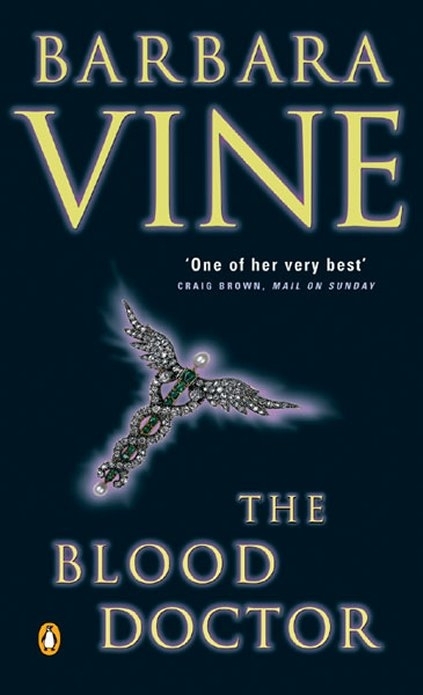- this large print edition published by Chivers Press 2002
- ISBN 0-7540-1786-9
- 507 pages
Synopsis (publisher)
Barbara Vine's new novel is about blood - blood in its metaphysical sense as the conductor of an inherited title and blood in its physical sense as the transmitter of disease.
The current Lord Nanther, experiencing the reform of the House of Lords, embarks on a biography of his great-grandfather, the first Lord Nanther, favoured physician to Queen Victoria, expert on blood diseases and particularly the royal disease of haemophilia. What he uncovers begins to horrify him as he realizes that Nanther died a guilty man - carrying a horrific secret to the grave.
The Blood Doctor weaves effortlessly between past and present, public life and private life. The result is a superbly satisfying novel about ambition, obsession and bad blood.
My Take
As she often did, Barbara Vine (Ruth Rendell) took circumstances that were prompted by her position and work in the House of Lords as a springboard for this stand-lone novel. She was appointed a Commander of the Order of the British Empire (CBE) in the 1996 Birthday Honours and a life peer as Baroness Rendell of Babergh, of Aldeburgh in the County of Suffolk, on 24 October 1997. She sat in the House of Lords for the Labour Party. In 1998 Rendell was named in a list of the party's biggest private financial donors.
The reform of the House of Lords took place in 1998 just after she had been made a life peer so what is happening to Martin Nanther is essentially what was happening there, although of course she was a life peer, not an hereditary one like Nanther.
By the time of the reform, the House of Lords was being overwhelmed by an excess of hereditary peers and had become unsustainable and unwieldy in its present form. The idea that the blood of the hereditary peers was somehow "special" had lost favour. They wouldn't lose their titles or their estates, simply their right to sit in the House of Lords.
Martin Nanther has begun amassing memorabilia about his great grandfather Henry Nanther, given a hereditary peerage at the end of the nineteenth century by Queen Victoria for his work on diseases of the blood, particularly of haemophilia of which she was a carrier (which she refused to recognise), and which her own sons and grandsons were afflicted by.
Martin is transfixed by a letter written by one of his great-aunts in which she says Henry Nanther had done terrible things. Martin aims to eventually write a biography of his great-grandfather, and his research takes him to meet cousins and distant relatives whom he has never met, and to become aware of the presence of "tainted" blood in his own family.
Running alongside the main plot is the sub-plot of Martin and his second wife Jude attempting to have a baby, and the revelation that it is a genetic problem that is causing her frequent miscarriages.
This wasn't a book I could read quickly. There was quite a lot of history to absorb, and though I read it in large print, or perhaps because I did, it was also quite weighty.
However, a fascinating read.
My rating: 4.7
I've also read
Vine, Barbara:
THE BIRTHDAY PRESENT
4.8, A DARK ADAPTED EYE
4.3, THE CHILD'S CHILD
Rendell, Ruth:
FROM DOON WITH DEATH - Wexford #1
4.5, A NEW LEASE OF DEATH- Wexford #2
4.6, THE BEST MAN TO DIE - Wexford #4
4.3, A SLEEPING LIFE, Ruth Rendell - Wexford #10
4.7, PUT ON BY CUNNING - Wexford #11
4.6, THE VAULT- Wexford #23
4.5, NO MAN'S NIGHTINGALE- Wexford #24
PORTOBELLO
4.7, THE MONSTER IN THE BOX
4.5, A SIGHT FOR SORE EYES
4.5, THE SAINT ZITA SOCIETY
4.6, THE MASTER OF THE MOOR
4.4, DARK CORNERS
4.6, A SPOT OF FOLLY

1 comment:
Intriguing plot.
Post a Comment